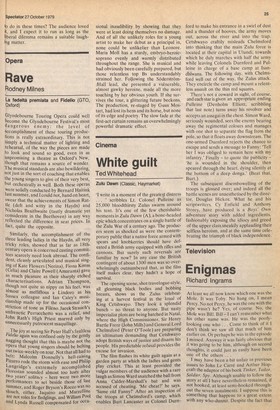Cinema
White guilt
Ted Whitehead
Zulu Dawn (Classic, Haymarket) 'I write in a moment of the greatest distress . . . ' scribbles Lt. Colonel Pulleine as 25,000 bloodthirsty Zulus swarm around his tent. It's one of the few cherishable moments in Zulu Dawn (A), a bone-headed epic which concentrates on a single battle of the Zulu War of a century ago. The producers seem as shocked as were the contemporary public that a native force armed with spears and knobkerries should have defeated a British army equipped with rifles and cannons. But surely such reversals are familiar by now? In any case the British contingent of about 1300 men was so overwhelmingly outnumbered that, as the film itself makes clear, they hadn't a hope of survival.
The opening scene, shot travelogue-style, all gleaming black bodies and bobbing breasts, shows us the Zulus celebrating at a harvest festival in the kraal of King Cetshwayo. They look a splendid bunch — no threat to anyone. But nasty imperialist plots are being hatched in Natal. where the High Commissioner, Sir Henry Bartle Frere (John Mills) and General Lord Chelmsford (Peter O'Toole) are preparing an ultimatum demanding that Cetshwayo adopt British ways of justice and disarm his people. His predictable refusal provides the excuse for invasion.
The film flashes its white guilt again at a garden party at which the ladies and gents play cricket. This at least provided the vulgar members of the audience with a rare laugh as Simon Ward snatched the ball from Anna Calder-Marshall's bat and was accused of cheating. 'Me cheat?' he says. 'Same old Fanny!' After an inspection of the troops at Chelmsford's camp. which enables Burt Lancaster as Colonel Darn ford to make his entrance in a swirl of dust and a thunder of hooves, the army moves out, across the river and into the trap. Cetshwayo craftily misleads Chelmsford into thinking that the main Zulu force is located at their capital in Ulundi, towards which he duly marches with half the army while leaving Colonels Durnford and Pulleine in charge of a base camp at Isandhlwana. The following day, with Chelmsford well out of the way, the Zulus attack. They encircle the camp and mount a relentless assault on the thin red squares.
There's not a coward in sight, of course. and each star is given an appropriate ending. Pulleine (Denholm Elliott, scribbling that last note) turns away his revolver and accepts an assegai in the chest. Simon Ward, seriously wounded, sees the enemy bearing away the regimental colours and manages with one shot to separate the flag from the pole. so that it floats away downstream. The one-armed Durnford rejects the chance to escape and sends a message to Fanny: 'Tell her I was obliged to remain here with my infantry.' Finally — to quote the publicity — 'he is wounded in the shoulder, then speared through the heart, dying silently at the bottom of a deep donga.' (Beat that, Burt.) The subsequent disembowelling of the troops is glossed over; and indeed all the battle scenes are anaesthetised by the director, Douglas Hickox. What he and his scriptwriters, Cy Enfield and Anthony Storey. have produced is a Boys' Own adventure story with added ingredients, fashionably exposing the idiocy and greed of the upper class,sneakily applauding their selfless heroism, and at the same time celebrating the triumph of black independence.


































 Previous page
Previous page